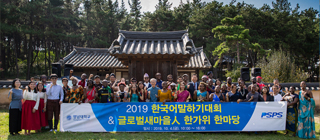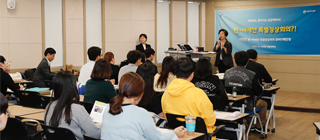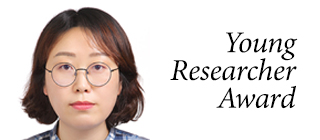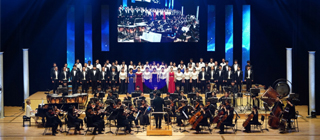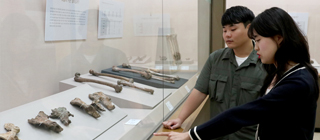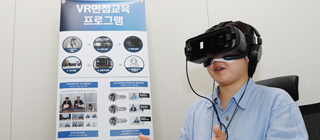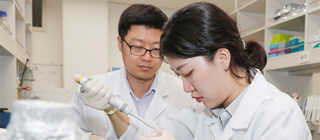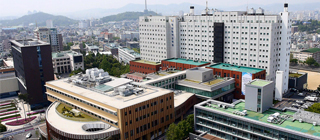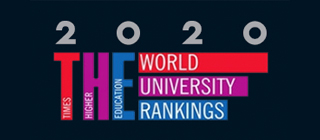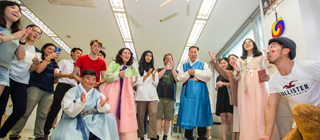-
Joined by international students at the Park Chung Hee School of Policy and Saemaul... Korean speech presentations on themes such as ‘My Life in Korea’ Also holding Korean traditional cultural events such as samul-nori and jegi-chagi Opportunity for international students to ‘understand the Korean language and Korean culture’ [October 4, 2019] YU (President Sur Gil-soo) held the ‘2019 Korean Speech Contest & Global Saemauler Chuseok Festival’ for international students at YU. This event aims at enhancing understanding among international students on Korean culture and Korean language to strengthen a sense of membership as international students. Eleven international students studying at the YU Park Chung Hee School of Policy and Saemaul participated in the Korean speech contest held at the YU Folk Village in the morning of the 4th. Eleven students from seven different countries including Uganda, Myanmar, Tanzania and Ethiopia gave speeches in Korean based on themes such as ‘What the Park Chung Hee School Means to Me’, ‘My Life in Korea’, ‘The Happiest Moment in My Life’, etc. Nan Dar Aung (40, Department of Saemaul and International Development, third term of master’s degree program, left on photo below) from Myanmar won first place. Nan Dar Aung said, “My Korean language skills improved greatly while preparing for this Korean speech contest. Besides the rankings, participating in the Korean speech contest was a great experience as I was able to learn a bit more about Korea.” Following the Korean speech contest, the ‘Global Saemauler Chuseok Festival’ was held. A total of about 70 people including students and professors at the Park Chung Hee School of Policy and Saemaul experienced traditional Korean cultures through samul-nori, jegi-chagi, etc. International students from around the world also demonstrated their traditional dances to help elevate understanding on the cultures of various countries. YU Park Chung Hee School of Policy and Saemaul Director Kim Gi-soo who prepared for this event said, “By making a speech in Korean about what they learned and experienced while studying in Korea, they gained the opportunity to more effectively train in Korean and to gain deeper insight on Korean culture. I hope that you they will be able to experience various traditional Korean cultures and make good memories from studying in Korea through this opportunity.” He also added, “I hope that the knowledge and Korean language skills that students picked up at the Park Chung Hee School will help them develop their countries and create networks with Korea once they return to their home countries.” Meanwhile, YU established the Park Chung Hee School of Policy and Saemaul to foster global Saemaul leaders in developing countries back in November 2011. Unlike international students in general undergraduate and graduate schools, international students at the Park Chung Hee School are comprised of public employees and public agency workers who plan and execute policies in their home countries, social activists and professionals. They can earn their master’s degree and study Korean over a relatively short study-abroad period of 18 months and YU offers various traditional Korean cultural events such as Korean speech contests to help them gain a broad assortment of experiences on Korean culture. There are currently 49 next-generation leaders from 20 countries studying at the Park Chung Hee School and as of now, a total of 539 people from 63 countries around the world including from Asia, Africa, Europe and the Americas learned the successful development experience of Korea. They have since then returned to their home countries to spread the Saemaul spirit and furthermore, they are effectively applying the Saemaul Undong for the local social development of their countries.
-
-
Recognized for research achievements on protein (transthyretin) muscle growth and differentiation control Earned bachelor’s, master’s and PhD in biotechnology at YU Performed research projects of the National Research Foundation, published papers in SCI journals, and continued vibrant research activities [October 10, 2019] Professor Lee Eun-joo (38, left on photo) of the YU Cell Culturing Research Center (Chief Choi In-ho) received the ‘Young Researcher Award’ at the 30th Korean Society of Molecular and Cellular Biology conference held at the Seoul COEX from September 30 to October 2. Professor Lee was recognized for her research achievements by presenting her research that revealed a new mechanism of transthyretin, which is known to be a protein that transports thyroid hormones from the blood, to control muscle growth and differentiation through a symposium and poster. Professor Lee earned her bachelor’s, master’s and PhD in biotechnology all at YU. Since her years in graduate school until now, she has been recognized for her research capacities by conducting research as a research fellow at the National Research Foundation, joint research with new researchers, etc. Currently, Professor Lee is the principal investigator for the Next-Generation Bio Green 21 Project (Rural Development Administration) and the New Research Project National Research Foundation), and she has also been actively engaged in research such as publishing papers as the principal author for world-renowned academic journals such as <Cells>, <Seminars in Cancer Biology>, <Molecular Neurobiology>, <FASEB J>, <Scientific Reports>, etc. through joint research with Biotechnology Professor Choi In-ho.
-
Comprised of YU finance and economics alumni and held first concert since its establishment in 2018 at the alma mater Harmony of Cheonma Alumni Orchestra, YU Professor Choir, and the School of Music Choir [October 5, 2019] <Seoul Cheonma Choir’s 1st concert – YU Cheonma Art Center (October 5, 2019)> The Seoul Cheonma Choir (Director Choi Byung-moon, Law class of ‘76) held its first concert after its founding in huge success. The Seoul Cheonma Choir was founded in 2018 by YU alumni in finance and economics working in various fields in the Seoul area. They held their first concert at their alma mater, Yeungnam University. This concert, which was held at the YU Cheonma Art Center Grand Hall at 5 p.m. on the 5th, was conducted by Insiem Arts Corporation Director Noh Hees-seop (Major of Voice ‘91), who is famous as the ’Singer of the Streets’ and tenor Kim Hyun-soo who was part of the Forte Di Quattro team that won in the JTBC Phantom Singer contest, soprano Choi Yoon-hee, tenor Han Yong-hee and trumpeter Ahn Hee-chan (Major of Orchestral Music ‘84) also participated in the concert. In addition, the Cheonma Alumni Orchestra, YU Professors’ Choir and the School of Music Choir held a joint performance to show their support for the first concert of the alumni choir. The concert kicked off with the Seoul Cheonma Choir’s ‘Rise of Cheonma’, ‘Morning Dew’, and ‘Song of Blessing’, and the collaboration with trumpeter Ahn Hee-chan and the opera collaboration with the School of Music Choir showed off harmony among alumni. This concert ended with an Arirang sonata performed jointly by the Seoul Cheonma Choir, YU Professors’ Choir, School of Music Choir and North Korean defector pianist Kim Cheol-woong. YU President Sur Gil-soo, YU General Alumni Association Chairman Jung Tae-il, Finance and Economics Alumni Association Chairman Yoo Gun-ha, Samil Spinning Chariman Noh Hee-chan and other YU alumni attended to congratulate the first concert of the Seoul Cheonma Choir. YU President Sur Gil-soo said, “I believe that the strong ties of YU alumni made this great concert possible today. Just as the alumni who are working in various parts of society came together to create a beautiful harmony, I hope that YU alumni will continue to strengthen their bonds.”
-
YU Museum collaborates with various exports including the National Forensic Service to make a 3D facial restoration using human bones The special exhibit, ‘Ancient human skeletons, reviving ancient Apdok people’ opens on the 26th Research and analysis of 259 human bones... Revealed the biological and anthropological features of ancient people [September 23, 2019] < "Confirmation of earliest family burial from 1,500 years ago such as couples and father and daughter, etc." / Aired on Yonhap News TV on September 19, 2019> <YU Museum Special Exhibit 'Ancient Human Skeletons, Reviving Ancient Apdok People' (September 26 – November 29, 2019)> The YU Museum (Director Jung In-sung) will restore and reveal the face of a woman from the ancient Apdok Kingdom (located in today’s Gyeongsan, Gyeongbuk region) from 1,500 years ago. The YU Museum will put on exhibit the special exhibit ‘Ancient Human Skeletons, Reviving Ancient Apdok People’ from September 26. This special exhibit will reveal the results of the research on 259 human skeletons from the people of ancient Gyeongsan excavated in the ancient burial grounds of Imdang-dong and Joyoung-dong through the excavations of the ancient Imdang Remains tombs and burial grounds conducted in 1982, 1988 and 1989. The YU Museum had issued the ancient human skeleton research results in the ‘YU Museum Collection Gyeongsan Imdang Remains Excavation Human Bones Research Archives’ in December of 2013, and this is the first time to reveal it to the public. In particular, this special exhibit restored the face of a woman from ancient Apdok using 3D rendering technologies, thus attracting huge attention even before the start of the exhibit. Because the discovered skull was preserved well in its original form, it was possible to make restore the face precisely. It was found that this restored face belongs to a woman between the ages of 21 and 35 and was buried in the ancient burial ground in Imdang 5B-2 (built in the late 5th century) that was excavated in 1982. Experts from various fields including forensics and art worked together in the facial restoration work using the human bones. Under the supervision of the YU Museum, the team of the Seoul Catholic University Medical School Professor Kim I-seok completed 3D skull modeling using CT of the human bones, and Dr. Lee Won-joon of the National Forensic Service restored the muscles and skin. Afterwards, artist Yoon Ah-young worked on graphic coloring and realistic picture work to complete the project. <Skeleton excavated from Imdang 5B-2 (female, 21-35 years of age)-facial restoration process> (from photo on top left, excavated skeleton, skull CT) (from photo on bottom left, face restored with 3D, wearing clothes) This special exhibit will not only offer a comprehensive view of the facial restoration process, but it also showed the age, gender, height and various pathological phenomena of the excavated human skeleton. DNA analysis was also performed to check the family relations of the buried as well. YU Museum Director Jung In-sung, who supervised this exhibit, said “The human skeletons discovered being preserved for over 30 years in its original form by the YU Museum acted as the cornerstone for these research achievements. Human skeletons did not receive much attention as relics in the past. However, various research and analyses have become possible using the human bones thanks to the latest science technologies. It was possible to study the biological and anthropological characteristics of the people from that period.” He added, “We are planning to restore the faces or more people using the skeletons of not only women, but also men, royalty and the class buried alive with the dead, as well as adults and children. Furthermore, we are planning to track the ritual food and distribution routes of ancient times by analyzing various mammals and birds such as pheasants, as well as fish bones and clams together with shark bones that were filled with the tombs back then.” This special exhibit will open at 4 p.m. on the 26th and run until November 29. Admission hours are from 10 a.m. to 5 p.m. on weekdays, and will be closed on weekends and holidays. For details, check the YU Museum homepage (http://museum.yu.ac.kr/). During the special exhibit period, there will also be a variety of relevant programs such as seminars that anyone can attend including students and the general public. At 2 p.m. on October 4 is scheduled the academic seminar ‘Studies on ancient skeletons and the people of Apdok’ that will be joined by skeleton experts at the YU Museum auditorium. A total of four lectures by skeleton experts titled ‘Ancient Skeleton Story Explained by Experts’ are scheduled in October and November, and during the exhibition period, the experience-type education ‘Let’s Play Skeleton’ (inquiries 053-810-1712) are also scheduled. Meanwhile, the YU Museum signed the ‘MOU for Joint Pursuance of Apdok Kingdom Cultural Relics Research and Utilization Project’ together with Gyeongsan City in March and has been engaged in research on ancient skeletons excavated at the Gyeongsan Imdang-dong and Joyeong ancient burial grounds, restoration of the faces of the people of Apdok, research on the plant and animal genes excavated from the ancient burial grounds, and restoration of restoration of ancient diet and life history. This special exhibit is conducted as part of the ‘University Museum Promotion Support Project’ hosted by the Korea University Museum Association.
-
Career and employment counseling office, 1:1 mock interview office, job cafe, etc. 17 full-time consultants help students with employment through career exploration and employment consulting ‘VR interview machine’ that applies contents per company and job... Practice in a realistic interview room environment [September 17, 2019] YU (Sur Gil-soo) opened the YU Career Employment Center. The purpose of this center is to help students set their career path early on and improve their employment capacities. The YU Career Employment Center that opened on the 17th spans across a total floor space of 583m2 on the first and second floors of the YU Information Processing Center building and is comprised of the career consulting office, employment consulting office, 1:1 mock interview room and job cafe. There are a total of 17 full-time consultants at the career and employment consulting offices and they provide counsel for the students’ aptitude test and career exploration, as well as improving employment capacities. The employment consulting office and the job cafe on the first and second floors has an employment study space with a total of 123 seats where students can come to study on their own or in group studies. <Students receiving counseling from expert consultants at the YU Career Employment Center> In particular, high-tech VR (Virtual Reality) interview devices were introduced for the first time among universities in the Daegu and Gyeongbuk areas with the opening of the YU Career Employment Center. Two units were installed in the 1:1 mock interview room of the YU Career Employment Center and four in the University Job Center to help improve student competence for interviews. <A student takes part in a virtual interview using the VR interview device at the YU Career Employment Center mock interview room> The VR interview devices that were newly installed have various contents by company and job position. By wearing the VR device, selecting companies and entering their history, students can practice taking interviews in a situation similar to actual interview environments such as the interview environment and interviewer. VR interview devices can be used by individual students without having to make separate preparations and is therefore expected to be very useful for students who will soon be searching for jobs. Woo Yeon-joo (23, YU Department of Korean Language and Literature, senior), who visited the YU Career Employment Center as soon as it opened on the 17th, said, “Students preparing for employment do not have many opportunities to practice in similar situations as that of actual interviews. I think that by using the VR interview devices before actual interviews at companies, students will have a higher chance to perform better at the actual interview.” She added, “I would like to use the VR interview device at the Career Employment Center later when I have an actual job interview.” <Students receiving counseling from expert consultants at the YU Career Employment Center> YU Employment Office Director Lee Seung-woo (Director of the University Job Center) said, “We have constructed an educational environment where students can receive assistance from experts and high-tech devices to explore their individual aptitudes, set their career paths, and strengthen their employment capacities,” while adding, “We will not spare any support to create an employment infrastructure where students can receive support from YU from their admission to graduation and even after joining the professional world.”
-
International joint research with Fudan University of China, published in the world’s most acclaimed journal in the immunotherapy of cancer sector Proved treatment of primary cancer and removal of cancer metastasis in studies on lab rats [September 17, 2019] <Department of Medical Biotechnology Professor Jin Joon-oh’s research team that developed new technologies that can be applied in immunotherapy of cancer through international joint research> (left to right: YU Graduate School of Medical Biotechnology master’s degree course Park Hae-bin and Professor Jin Joon-oh) The YU Department of Medical Biotechnology Professor Jin Joon-oh’s (39) research team developed new technologies that can be applied in immunotherapy of cancer through an international joint research project. Li Xu, a master’s degree student at Fudan University, and Park Hae-bin (24, 1st term in master’s degree course) of the YU Graduate School of Medical Biotechnology participated as the co-primary author and Professor Jin participated as the corresponding author. The study was published in the August 2019 issue of the world’s most authoritative academic journal in the immunotherapy of cancer sector, <Journal for Immunotherapy of Cancer, (impact factor (IF) = 8.68)>. Professor Jin’s research team developed a ‘immuno-photothermy treatment liposome’ by adding immuno-activators and photothermy agents in liposome (phospholipid double layer structure with space inside that can be used for transporting materials, and is used as an antibiotic or drug delivery vehicle of anti-cancer drugs for treating cancer). The research team proved to noy only treat primary cancer in lab rats, but also that it could remove cancer that spread to other areas. Professor Jin said, “By mixing antigens of cancer cells through photothermy treatment and immuno-fortifiers secreted from liposomes, we induced cancer antigen-specific immuno-activity. Through this, we confirmed in our research that metastasis cancer was also removed.” He added, “This study will make immunotherapy of cancer possible using antigens created when cancer cells die.” Professor Jin who led the research team has published 32 research papers over the past five years based on this research for developing new immuno-supplements to develop cancer medicine as well as on developing infectious disease treatment. The studies of Professor Jin were published in world-acclaimed academic journals such as Biometerials, Nanoscale, and Frontiers in Immunology, thus receiving international recognition for his research achievements.
-
The number of SCI-class thesis per medical school professor 1.0531 Proving the excellence of the faculty... contributing to improving the quality of resident education and medical service [September 17, 2019] <View of the YU Medical Center> The YU Medical Center (Director Kim Tae-nyeon) announced that it was ranked third in the nation for SCI (Science Citation Index) class theses (dental, traditional Korean medicine, veterinarian department not included) per medical school professor. Based on the Ministry of Education’s Korean Council for University Education (university information announcement center) website’s (https://www.academyinfo.go.kr) information, the number of SCI-class papers per professor at YU was 1.0531, placing third following Seoul National University at 1.5375 and Yonsei University at 1.1899. While the number of total studies tend to be proportional to the number of full-time faculty, the actual research performance is revealed through the thesis performance per person. The research achievements of YU medical school professors have significant meaning in that it is connected to improving the quality of education and medical services of residents. While patients are becoming more and more lopsided to university hospitals in the Seoul area, this proves the excellence of the faculty that provides practical treatment at university hospitals in provincial regions. It is expected that such research achievements of medical school professors in other regions will have a positive effect on accelerating the regional balance of medical services in the future. YU Medical Center Director Kim Tae-nyeon said, “This achievement of being third place in the nation for SCI-class papers per medical school professor did not happen overnight,” while adding, “Recently, our medical center has been contributing to the development of the bio medical industry based on high quality research and education infrastructure being selected as the convergence medical scientist fostering institute, innovative medical scientist joint research project institute, etc. We will continue to provide support for active research activities for the development of medicine in Korea.”
-
Received good reviews from world-acclaimed college assessment institutes Evaluated a total of 1,396 universities in 92 countries including 31 Korean universities Recognized for world-class research capacities being recognized first place in Korea for five consecutive years in the math and computer science field in the Leiden Ranking [September 16, 2019] YU (President Sur Gil-soo) was ranked 17th in Korea (801-1,000 in the world) in the 2020 world university rankings announced the British global university evaluation institute, ‘THE (Times Higher Education)’. A total of 1,396 universities in 92 countries around the world were included in the ‘THE World University Rankings 2020’ announced on the 11th. A total of 31 Korean universities including YU, Seoul National University (64th in the world), Sungkyunkwan University (89th in the world). In addition to YU, Kyungpook National University, Sogang University, University of Seoul, Ajou University, Inha University, Chonnam National University, and Chonbuk National University were ranked at a tied 17th in Korea an 801-1,000 in the world. THE, which was established in 1971, is a global university assessment institute with the greatest authority in the world together with QS (Quacquarelli Symonds) of England and it has been announcing global college rankings annually since 2004. It ranks the university using five indices such as education conditions (30%), research performance (30%), thesis citation (30%), internationalization (7.5%), and industry-academic cooperation revenue (2.5%). In particular, the world university rankings of THE applies strict standards, thus being assessed to have high global prominence. YU was ranked first place in Korea (45th in Asia, 181st in the world), thus being recognized for its world-class research capacities in the mathematics & computer science engineering in the ‘2019 Leiden Ranking’ announced in May. YU has maintained first place in Korea for five consecutive years. The Leiden Rankings assesses global university rankings based on the qualitative level of theses, thus proving the excellence of research capacities. YU was ranked 12th in Korea in the overall rankings and sixth in the bio and life science sectors, thus being recognized for its outstanding research capacities in all sectors. Regarding such achievements, YU President Sur Gil-soo said, “This shows that the educational and research knowhow that YU has amassed over the years has been recognized by a world-acclaimed college evaluation institute,‘ and added, ”We will spare no effort to further raise the level of education and research to world-class levels.“
-
